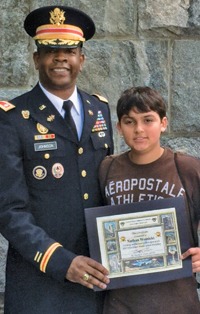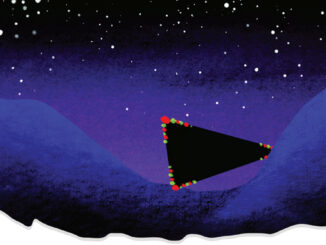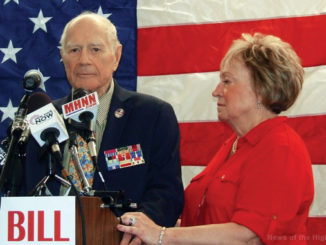
Nathan Woinicki received a certificate from Lt. Col. Tony Johnson at the end of a four-day program at West Point.
Sixth-grader Nathan Woinicki skipped four days of school last month. He hacked into computers, flew drones through a hula hoop, and exploded balloons. Actually, he worked even harder than if he had attended class in Cornwall. Nathan was part of a STEM program (Science, Technology, Engineering and Math) at West Point.
It wasn’t easy getting accepted. The program had room for 120 students from across the country. To qualify, Nathan had to complete an application, write an essay, get teacher recommendations, and show that he was proficient in science and math. His extracurricular activities may have helped. The sixth-grader plays piano for the patients at a rehabilitation home and he competes as a member of the middle school chess team. “I know I can’t beat him,” his father (Mark Woinicki) says proudly.
Nathan’s father is retired from the military after serving as an aircraft mechanic. He deliberately settled near West Point, but he was unaware of the STEM program until he received an email blast. “It was right in our back yard,” he said last week, “and we didn’t know it.”
Nathan’s mother, Maria Woinicki, convinced him to apply. The program, which includes traditional classwork, is designed to get students excited about technology. It also introduces them to West Point. The youngsters (who will be seventh- or eighth-graders next fall) slept in barracks and had cadets as mentors.
A knock on the door got them up in the morning, but they could hear “Reveille” being played elsewhere on the campus. Before going to breakfast, they stood at attention and saluted the flag.
Nathan said the day started at 7:30 a.m. and ended at 9 p.m.; so it really wasn’t a vacation. The students were split into four teams. In the classroom, they raced to see who would be the first to solve a problem. During their free time, they took part in a kickball tournament. They also got a tour of the campus.
Theoretically, Nathan could return to the program next spring when he’s in seventh grade, but it’s very hard to be accepted twice; it limits the opportunity for other students. At the end of the four days, Lt. Col. Tony Johnson (the program director) offered some advice. “Keep your eyes open for other workshops,” he told the students and their families. “Work hard in math; keep your grades up, and look for other interesting experiences.”
When Nathan returned to Cornwall, his science teacher asked about the program, two friends wanted to know how they could apply, and Nathan had to catch up on four days of school work.



